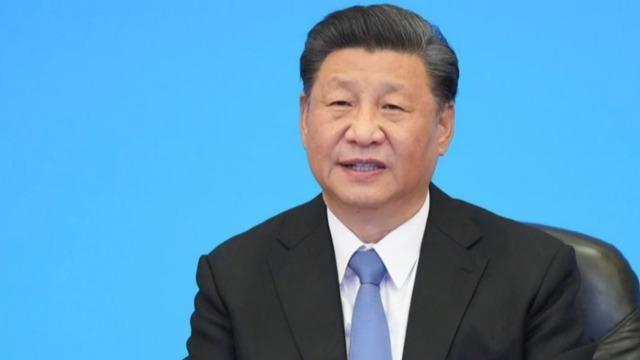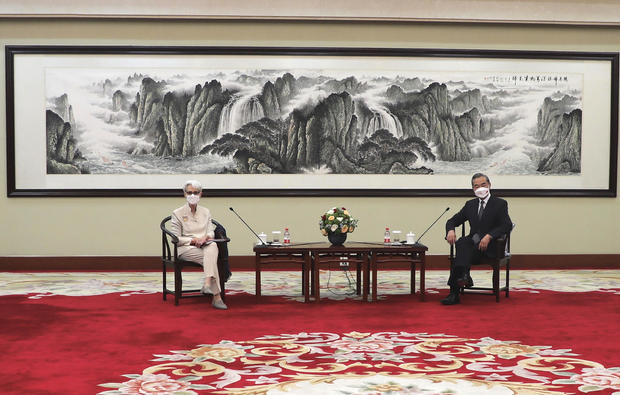▶ Watch Video: Biden administration formally accuses China of Microsoft systems hack
Hong Kong — A meeting of high-level diplomats from the United States and China ended in what Chinese officials called a “stalemate” on Monday, cooling near-term hopes for a major summit between U.S. President Joe Biden and Chinese president Xi Jinping.
U.S. Deputy Secretary of State Wendy Sherman, the most senior Biden administration official to visit China to date, met with Chinese Foreign Minister Wang Yi and Vice Foreign Minister Xie Feng in the port city of Tianjin. But China’s Ministry of Foreign Affairs blasted Washington with a salvo of six statements that accused the U.S. government of trying to “contain and suppress” China, attacked the U.S. as the “inventor of coercive diplomacy,” and alleged that the root of the deadlock between the world’s two biggest economies was because some Americans see China as “an imagined enemy.”
During Monday’s meeting, Beijing also delivered a list of demands to Washington, which included the unconditional lifting of visa restrictions on Chinese Communist Party members and an end to the labeling of Chinese media as “foreign missions,” a designation from the Trump White House aimed to make a distinction between propaganda and free press. The list was the top trending topic on China’s Twitter-like social media platform Weibo, with 85 million views by early evening Monday.
“The Deputy Secretary and State Councilor Wang had a frank and open discussion about a range of issues, demonstrating the importance of maintaining open lines of communication between our two countries,” spokesperson for the U.S. State Department, Ned Price, said at the end of the day. “The Deputy Secretary underscored that the United States welcomes the stiff competition between our countries – and that we intend to continue to strengthen our own competitive hand – but that we do not seek conflict.”
“Guard rails and parameters”
In a preview of Sherman’s China trip over the weekend, senior White House officials had said she would convey the need for “guard rails and parameters” for the U.S.-China relationship to recover from one of its lowest points since Washington normalized relations with Beijing in 1979. Officials also said Washington welcomed “stiff and sustained competition,” but that both sides need “to play by the same rules and on a level playing field” so they do not “veer into conflict.”
Washington portrayed Sherman’s meetings as “a continuation of the discussions” held at a March summit in Alaska — the first high-level bilateral talks between the Biden administration and China. But the talks also seemed to echo the acrimonious tone of that summit, when U.S. Secretary of State Antony Blinken voiced deep concerns about potential genocide in Xinjiang, the erosion of democratic freedoms in Hong Kong, the protection of the self-ruled democratic island of Taiwan over which Beijing claims control, cyberattacks on the U.S. and economic coercion of America’s allies.
At the time, Blinken’s counterpart, Yang Jiechi, pushed back and said he thought the United States should “do better on human rights,” and that “the slaughter of African Americans has always been a problem,” in the U.S.
On Monday, Sherman’s counterpart Xie Feng said, “the United States engaged in genocide against Native Americans” and “has lost 620,000 lives because of its halting response to COVID-19.”
China’s official death toll from COVID is just over 4,600 people and the country has fewer than 93,000 confirmed cases.
“How can the United States portray itself as the world’s spokesperson for democracy and human rights?” Xie said.
“We scolded them well”
On Weibo, which is known for its nationalist bent and government censorship, comments were critical of Washington and expressed loyalty to Beijing.
“We are busy following our (Chinese Communist) Party and nation to become stronger and more powerful. There’s no time to care about the U.S. – get out of here,” one user wrote, referring to the U.S. delegation.
“No results are coming out of this but the U.S. would definitely say they have the upper hand,” said another.
“They came all the way here to get scolded. And we scolded them well,” posted a third.
Neither the U.S. nor the Chinese delegations made public plans for a welcome or departure meal together. Meanwhile, Chinese internet users joked Beijing should serve their U.S. counterparts ‘cup noodles,’ referring to the perception of many people in China that the U.S. was a less-than-hospitable host during the March summit in Alaska, when a hot-mic moment, reported by Reuters, caught State Councilor Wang Yi asking Yang Jiechi if he had lunch.
China’s top diplomat responded, “Yes, I had instant noodles.”
Grace Qi and Shuai Zhang in Beijing contributed to this report.



































